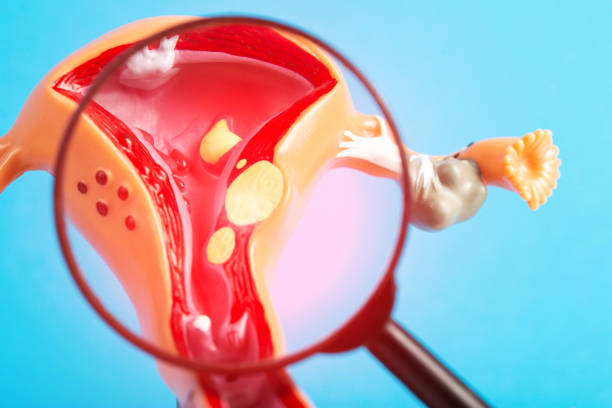Uterine fibroids are one of the most common gynecological conditions affecting women of reproductive age. However, signs of these disorders may be misinterpreted for other health issues or disregarded as “normal” symptoms, and as a result, many women are undiagnosed, despite their high prevalence. Here are ways to possibly recognize some signs that indicate one might have fibroids, so they can seek medical advice and manage them in a timely manner.
This blog outlines the most common uterine fibroids symptoms, how they can affect your day-to-day life, along with the importance of recognising these warning signs. We will discuss the uterine fibroids treatment options for women to decide on their health appropriately.
What Are Uterine Fibroids?
Uterine Fibroids (myoma): Noncancerous (benign) growths that develop in the uterus or on the uterus. Consisting of muscle and fibrous tissue, they can range from the size of a seed to the size of a watermelon. A woman can have one fibroid or, often, many fibroids at one time.
We know that the exact cause of uterine fibroids is not yet well understood, and that hormonal factors, especially estrogen and progesterone, seem to be important for their development. Other causes could be genetics, obesity, lifestyle, and environmental factors.
Why Recognizing Symptoms Matters?
Not all fibroids cause symptoms. In fact, many women will have fibroids for decades without having any health problems. But if uterine fibroid signs develop, they can be a huge distraction in day-to-day сonduct, fertility, and even well-being in the long term.
Early detection enables a woman to see a gynaecologist before complications (ex, anemia, infertility, or intense pelvic pain) set in. Recognizing these common signs is your first step in finding effective uterine fibroids treatment,
Common Uterine Fibroid Symptoms
Here are some of the most common uterine fibroids symptoms that a woman should not ignore:
- Heavy or Prolonged Menstrual Bleeding
Excessively heavy menstrual bleeding is one of the hallmark symptoms of uterine fibroids. This may manifest as:
Longer than seven days of periods
Passing large blood clots
Need to change sanitary pads or tampons multiple times.
This will cause these heavy periods, which can cause iron deficiency anemia, causing fatigue, dizziness, and shortness of breath.
Uterine fibroids can give you a constant sense of fullness or heaviness as well as pressure in the lower abdomen. This is something many women liken to a continuous state of being “full” or “bloated”. Large fibroids can also push on other organs, adding to the annoyance.
If fibroids become sufficiently large to press on the bladder, women may feel the need to urinate more frequently or urgently, without the bladder being full. Bladder blockage can happen in some situations as a result of the bladder not being emptied completely.
- Constipation and Bowel Pressure
Fibroids at the back of the uterus may push against the rectum, leading to constipation, trouble having a bowel movement, or a feeling of incomplete elimination.
Larger fibroids can put pressure on the nerves, causing lower back, buttocks, or leg pain. Even this symptom is missed mostly and confused with Sciatica or some other Musculoskeletal problem.
For others, sex may be painful–especially deep pelvic pain during or after sex for some women–due to the pressure fibroids put on surrounding organs. This is especially true when fibroids are positioned adjacent to the cervix or in positions that impact the motion of the uterus.
Sometimes, even when a person doesn’t gain weight, the woman may see an increase in the abdomen, as if it’s bloated. In rare cases, large fibroids can show the outward physical signs of pregnancy, which is often described as a “fibroid belly.”
- Fertility and Pregnancy Complications
Fibroids can interfere with conception and increase the risk of complications in pregnancy, including recurrent miscarriage, preterm labor, or problems during delivery. Ironically, women who are having difficulties getting pregnant may also be affected by fibroid disease (and should therefore be screened as a potential risk factor!).
- Emotional and Psychological Impact
In addition to the physical aspect, uterine fibroids also affect mental and emotional life. Dealing with unpredictable heavy periods, pelvic and back pain, or knowing that this monthly suffering might mean no children in the future, undermines quality of life as well as health and leads to stress and anxiety. Many women feel embarrassed or isolated, especially during periods when the symptoms of menstruation interfere with work, travel, or socialising.
When to See a Doctor For uterine fibroids treatment?
Not all fibroids need treatment, but if you have:
- Excessive menstrual bleeding causes anemia.
- Severe pelvic or back pain
- Rapid abdominal enlargement
- Difficulty urinating or bowel obstruction
- Fertility problems
Final Thoughts: Be the Boss of Your Own Health
The first step of protecting your reproductive wellness is recognizing the signs of uterine fibroids. Fortunately, if diagnosed early enough, women can choose from a variety of uterine fibroids treatment options, from drugs to advanced minimally invasive surgeries.
If you are having any of the above-mentioned symptoms, then visiting a gynecologist nearby is a necessity. If you are looking for the best uterine fibroids treatment, contact Dr. Gaurav Gangwani, an expert at Dr. Gangwani’s Vascular Clinic in treating uterine fibroids and various gynecological problems. He provides individuals with personalized and customized solutions to their health problems, with advanced diagnostic and treatment protocols.
With early recognition and professional care, you can take charge of your life again, enjoy life, and protect your fertility future.


